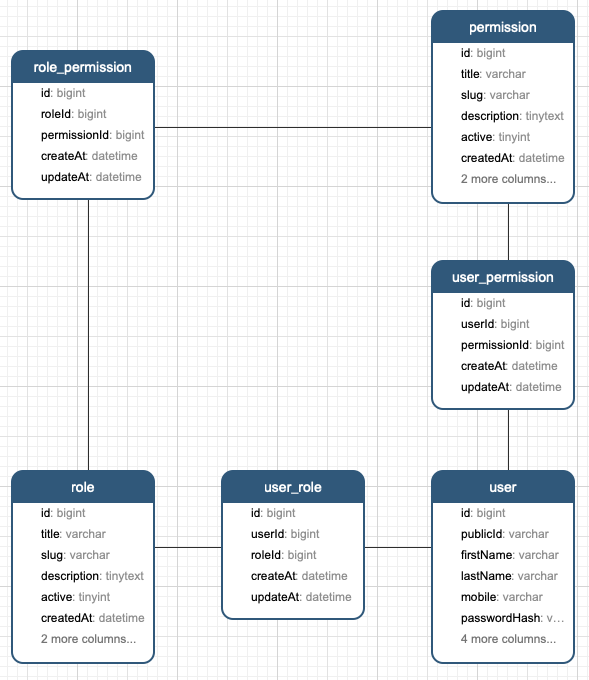这是一个flask基础框架,由于python之前只是写一些零散的脚本 刚好使用python构建一个项目脚手架
1. jwt token的流程
- short live token to make application more secure
- 工作流程
- 发送请求获取token+refreshToken(secure cookie, httponly,samesit)
- 发送请求(payload + token) 到后端,token存于内存变量,退出就失效
- 如果token失效,使用cookie的refresh token重新获取token
- 一般token维持一分钟,一分钟后就会失效,这可以阻止中间人攻击
- 同时要对参数加一个单项hash的加密,用来保证参数的完整性,最好包含请求时间
- header的部分也要做hmac的对称加密,后台刷新token是用hmac解密
- jwt token可以持久化到redis来做主动失效,例如白名单,因为我们应用想做成无状态的,方便其他系统调用,所以就没做成存token的机制
- 实现细节
set-cookie是在服务端做,不是在客户端做- 最主要是cookie的处理要注意httponly,secure,samesite都要加,不然可能会有后续请求拿不到之前服务器设置的cookie的问题
- 要注意的地方是这种方案还是有安全风险,虽然对secure cookie已经有一定的安全保证,但是无法保证不被一些扩展工具获取到cookie,所以为了无状态也是对安全这方面做了一点的折中。
2. 授权模型

3. 客户端实现
- redux-thunk, redux, react, react-hook, konva实现单向数据流应用
- 异步使用redux-thunk比redux-saga要方便使用,也基本能实现异步操作
- react-hook避免了写一大堆生命周期的代码
- konva画图可以兼容Typescript
4. 数据库的安全(XSS防范)
- 尽量不要写raw sql,使用sqlchemy的ORM最好,如果使用raw-sql一定要转义,要检查,否则可能会有xss攻击的风险
- 增加一些必要的索引,增加请求速度
- 对每条sql语句进行explain,查找优化的点
5. flask后台需要支持一些基础功能
-
日志,按天滚动,写两个handler
self.logger.setLevel(logging.DEBUG) formatter = logging.Formatter(getattr(config, "LOG_FORMAT")) timedRotatingFileHandler = handlers.TimedRotatingFileHandler( getattr(config, "LOG_FILENAME"), when=getattr(config, "LOG_WHEN"), interval=getattr(config, "LOG_INTERVAL"), backupCount=getattr(config, "LOG_BACKUP_COUNT"), ) timedRotatingFileHandler.setLevel(logging.INFO) timedRotatingFileHandler.setFormatter(formatter) errorLogHandler = handlers.RotatingFileHandler( getattr(config, "LOG_ROTATE_FILENAME"), maxBytes=getattr(config, "LOG_ROTATE_MAXBYTES"), backupCount=getattr(config, "LOG_ROTATE_BACKUP_COUNT"), ) errorLogHandler.setLevel(logging.ERROR) errorLogHandler.setFormatter(formatter) -
按环境区分配置
-
跨域设置响应头,要有处理option请求的逻辑,无需使用flask-cros之类的library
-
数据库返回的数据要序列化,写个通用的方法
from sqlalchemy.inspection import inspect class Serializer(object): def serialize(self): return {c: getattr(self, c) for c in inspect(self).attrs.keys()} @staticmethod def serialize_list(lo): return [m.serialize() for m in lo] -
有些地方要做单例,比如配置,logger这类
import threading lock = threading.Lock() class Singleton(type): _instances = {} # type: ignore def __call__(cls, *args, **kwargs): if cls not in cls._instances: with lock: if cls not in cls._instances: cls._instances[cls] = super(Singleton, cls).__call__( *args, **kwargs ) return cls._instances[cls]- sphinx文档生成
- 改成了支持markdown的方式,后面写文档直接写markdown文件就可以
- postman同样把api调用放到这里,可以方便团队使用postman配置文件快速开发
- sphinx文档生成